A little late for Public Domain Day (blogged here last year – and the issues there are updated here), here’s a list of written, artistic, and musical works which have now entered the public domain; and here’s a map of countries’ standard copyright terms, (created by Balfour Smith, Program Coordinator of the Center for the Study of the Public Domain, Duke University School of Law):
Santa’s Privacy Policy (via McSweeney’s)
On McSweeney’s:
Santa’s Privacy Policy
By Laurence Hughes [Originally published December 23, 2010.]
At Santa’s Workshop, your privacy is important to us. What follows is an explanation of how we collect and safeguard your personal information; the kind of information we collect; and your choices regarding our use and disclosure of this information.
Why Do We Need This Information?
Santa Claus requires your information in order to compile his annual list of Who is Naughty and Who is Nice, and to ensure accuracy when he checks it twice. …What Information Do We Collect?
We obtain information from a variety of sources. Much of it comes from unsolicited letters sent to Santa by children all over the world listing specific items they would like to receive for Christmas. Often these letters convey additional information as well, such as the child’s hopes and dreams, how much they love Santa, and which of their siblings are doodyheads.The letters also provide another important piece of information—fingerprints. We run these through databases maintained by the FBI, CIA, NSA, Interpol, MI6, and the Mossad. If we find a match, it goes straight on the Naughty List. …
There’s lots more detail where that came from; I suppose Santa had to introduce his privacy policy after the Federal Trade Commission imposed a record fine against him for violations of the Children’s Online Privacy Protection Act.…
The Contract in The Hobbit
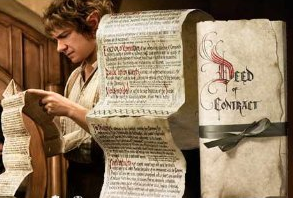 Following on from my posts about the contract law issues in Shrek Forever After and The Muppets, another major movie brings us interesting contract law issues: The Hobbit – An Unexpected Journey (blog | facebook | imdb | official site | twitter | wikipedia).
Following on from my posts about the contract law issues in Shrek Forever After and The Muppets, another major movie brings us interesting contract law issues: The Hobbit – An Unexpected Journey (blog | facebook | imdb | official site | twitter | wikipedia).
Warning: plot spoilers Bilbo Baggins is a typical hobbit, enjoying his quiet life in the Shire, when he is manoeuvred by the wizard Gandalf the Grey into hosting dinner for a company of dwarves. They tell him the story of how they lost their kingdom of Erebor and its great treasure to the terrifying dragon Smaug, and how they are now on a quest to reclaim their kingdom and treasure under the leadership of the legendary warrior, Thorin Oakenshield. Moreover, since a company of thirteen (twelve dwarves, and Gandalf) invites bad luck, they tell him that Gandalf had proposed him as a fourteenth member, as a burglar. Bilbo and the dwarves are unconvinced, but Gandalf re-assures them that Bilbo will prove more than up to the task when the time comes (“Hobbits can pass unseen by most if they chose which gives us a distinct advantage” in sneaking past Smaug), so the dwarves present Bilbo with a contract to join the company (script | video clip, via blog and YouTube):
…Thorin: Give him the contract.
Unconstitutional expenditures – VII – The judgments in McCrystal, Part 2
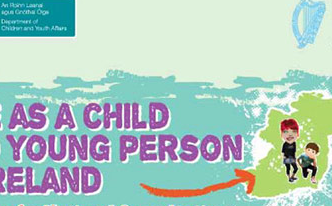 In McCrystal v The Minister for Children and Youth Affairs [2012] IESC 53 (8 November 2012), the Supreme Court’s per curiam established that the respondents had expended public moneys on a booklet, website, and advertising campaign in relation to a referendum in a manner which was not fair, equal, impartial or neutral. In judgments handed down on 11 December 2012 by Denham CJ, Murray J, Fennelly J, and O’Donnell J (Hardiman J concurring with all four) the Court gave reasons for the conclusions which had been expressed in the per curiam. My analysis of these judgments is in two parts. The first part, in my previous post, considered some of the issues raised in the judgments. The second part, in this post, considers the impact which those judgments have on the issues raised in my earlier posts (I, II, III, IV, V, VI).
In McCrystal v The Minister for Children and Youth Affairs [2012] IESC 53 (8 November 2012), the Supreme Court’s per curiam established that the respondents had expended public moneys on a booklet, website, and advertising campaign in relation to a referendum in a manner which was not fair, equal, impartial or neutral. In judgments handed down on 11 December 2012 by Denham CJ, Murray J, Fennelly J, and O’Donnell J (Hardiman J concurring with all four) the Court gave reasons for the conclusions which had been expressed in the per curiam. My analysis of these judgments is in two parts. The first part, in my previous post, considered some of the issues raised in the judgments. The second part, in this post, considers the impact which those judgments have on the issues raised in my earlier posts (I, II, III, IV, V, VI).
From my previous post, it is clear that, in McCrystal, the Supreme Court made two main findings. First, where the Government acts in clear disregard of the Constitution, then the Courts can intervene. Second, arising from McKenna v An Taoiseach (No 2) [1995] 2 IR 10, [1995] IESC 11 (17 November 1995), there is an obligation upon the Government, if it wishes to expend money providing information in relation to a referendum, to do so in a manner that is fair, equal, impartial and neutral.…
Unconstitutional expenditures – VI – The judgments in McCrystal, Part 1
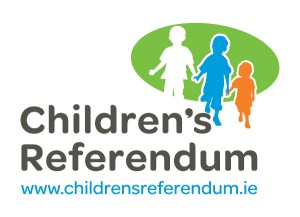 Regular readers of this blog will be familiar with my series of five posts so far (I, II, III, IV, V) on the per curiam in McCrystal v The Minister for Children and Youth Affairs [2012] IESC 53 (8 November 2012) (also here), which held that the defendants’ expenditure of public moneys on a website, booklet and advertisements in relation to the children’s referendum was in breach of the prohibition in McKenna v An Taoiseach (No 2) [1995] 2 IR 10, [1995] IESC 11 (17 November 1995). In the per curiam on 8 November last, the Court announced its decision, and said that judgments would be delivered on 11 December 2012. And, indeed, they duly were – judgments were delivered by Denham CJ, Murray J, Fennelly J, and O’Donnell J; Hardiman J concurred with all four. These judgments have already been the subject of a post by Paul McMahon on Ex Tempore blog, as well as a great deal of media comment (98fm | Belfast Telegraph | Irish Examiner | Irish Independent here, here, here and here | Irish Times here, here, here, here and here | RTÉ | TV3).…
Regular readers of this blog will be familiar with my series of five posts so far (I, II, III, IV, V) on the per curiam in McCrystal v The Minister for Children and Youth Affairs [2012] IESC 53 (8 November 2012) (also here), which held that the defendants’ expenditure of public moneys on a website, booklet and advertisements in relation to the children’s referendum was in breach of the prohibition in McKenna v An Taoiseach (No 2) [1995] 2 IR 10, [1995] IESC 11 (17 November 1995). In the per curiam on 8 November last, the Court announced its decision, and said that judgments would be delivered on 11 December 2012. And, indeed, they duly were – judgments were delivered by Denham CJ, Murray J, Fennelly J, and O’Donnell J; Hardiman J concurred with all four. These judgments have already been the subject of a post by Paul McMahon on Ex Tempore blog, as well as a great deal of media comment (98fm | Belfast Telegraph | Irish Examiner | Irish Independent here, here, here and here | Irish Times here, here, here, here and here | RTÉ | TV3).…
#Cameron to #Leveson: LOL
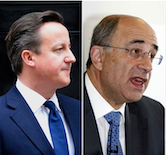 One of the most entertaining pieces of evidence that Lord Justice Leveson heard during his inquiry’s hearings into the culture, practice and ethics of the press concerned UK Prime Minister David Cameron‘s understanding of the popular sms abbreviation LOL. He had thought it stood for “lots of love“, and had used it to sign off his texts to Rebekah Brooks (sometime Editor of the News of the World, and the Sun, and CEO of News International), until he discovered that it in fact stands for “laugh out loud” (see transcript for 11 May 2012, p76 (pdf)). Given his rejection on Thursday afternoon of the main press regulation recommendations in Lord Justice Leveson’s Report (also here), published on Thursday morning, he is obviously laughing out loud at the Leveson Inquiry, not showering it with lots of love.
One of the most entertaining pieces of evidence that Lord Justice Leveson heard during his inquiry’s hearings into the culture, practice and ethics of the press concerned UK Prime Minister David Cameron‘s understanding of the popular sms abbreviation LOL. He had thought it stood for “lots of love“, and had used it to sign off his texts to Rebekah Brooks (sometime Editor of the News of the World, and the Sun, and CEO of News International), until he discovered that it in fact stands for “laugh out loud” (see transcript for 11 May 2012, p76 (pdf)). Given his rejection on Thursday afternoon of the main press regulation recommendations in Lord Justice Leveson’s Report (also here), published on Thursday morning, he is obviously laughing out loud at the Leveson Inquiry, not showering it with lots of love.
In essence, Leveson recommends that the press ought to be overseen by an independent self-regulatory body, with statutory underpinning, and governed by an independent Board. In so doing, he is adopting the basic structure of the Press Council of Ireland and the Office of the Press Ombudsman which were established by the media industry in Ireland and given statutory recognition pursuant to section 44 of, and Schedule 2 to, the Defamation Act, 2009 (also here), and described in great detail by John Horgan, the Press Ombudsman, to the Inquiry.…
The House that Disappeared on Tory Island – Updated
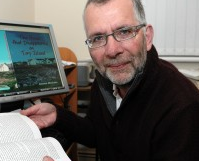 Journalist Anton McCabe (pictured left) has written a book about The House that Disappeared on Tory Island (Drumkeen Press, 2012), which was launched by former editor of the Irish Daily Star Michael O’Kane. Film-maker Neville Presho bought a house on Tory Island, but it vanished whilst he was abroad. I have written on this blog about the resulting court case. Now Anton McCabe tells the whole sad story. At the launch of the book, he said, “It is a great story and a true testament to … [Presho’s] refusal to give up his fight for justice”.
Journalist Anton McCabe (pictured left) has written a book about The House that Disappeared on Tory Island (Drumkeen Press, 2012), which was launched by former editor of the Irish Daily Star Michael O’Kane. Film-maker Neville Presho bought a house on Tory Island, but it vanished whilst he was abroad. I have written on this blog about the resulting court case. Now Anton McCabe tells the whole sad story. At the launch of the book, he said, “It is a great story and a true testament to … [Presho’s] refusal to give up his fight for justice”.
In advance of the launch, McCabe gave an interview to the Ulster Hearld which explained his involvement in the case:
…I had been going to Tory Island for quite a number of years and islanders had told me they were unhappy with what had happened … Going over in the ferry at Easter 2003, I was standing on the prow of the boat when I fell into conversation with another man before I realised he was the householder, Neville Presho. He was surprised I knew so much and had gone through a terrible time by then. Soon after that, which was ten years after the house had been destroyed, things started to happen.
Presidential freedom of expression
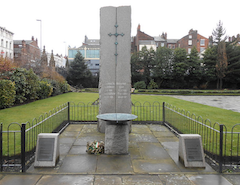
- The Great Hunger Memorial, St Luke’s Church, Liverpool, where President Higgins delivered his remarks.
(Image via Wikipedia)
Last week, the President of Ireland, Michael D Higgins, in response to questions from reporters during an official visit to Liverpool in the UK, made a number of unscripted remarks about a current political controversy in Ireland. The Presidency of Ireland is not an executive office in the same way as the Presidents of the US and France are – Ireland is a parliamentary democracy like the UK where the head of the executive is the Taoiseach (Prime Minister). Rather, the Presidency of Ireland is a largely ceremonial office, in much the same way as the Presidents of Italy and Germany are. As a consequence, the President’s remarks were seems as political and controversial. He denied overstepping the mark, and robustly defended his comments, but the incident has raised questions as to the limit of the President’s avowedly evolving role. Two articles recently published in the Irish Times neatly encapsulate the competing views. On the one hand, David Gwynn Morgan, Professor of Law Emeritus, UCC, argued that it was never intended for the president to act as a more effective opposition leader:
…Pitfalls of pushing out presidential boundaries
… the issue is whether he went beyond his proper authority.

